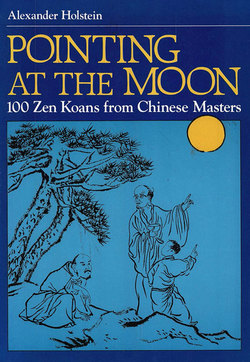Читать книгу Pointing at the Moon - Alexander Holstein - Страница 23
На сайте Литреса книга снята с продажи.
ОглавлениеJust Fall and Break
THERE ONCE lived a hermit of Sungyueh who was known for his unfathomable name of the Fallen and Broken Stove (P'o Tsao To). At Sungyueh Mountain, where he lived, there was a small chapel with a stove in it. For a long time, a great many pilgrims arrived there to offer sacrifices to all Buddhas, killing and cooking myriad animals in the stove.
One day, the hermit brought a crowd of monks from different places with him to visit his abode. Entering the chapel, he started to beat on the stove with a big club, saying "This is only a tile-making stove! What kind of spirits could dwell in it? How could it be so that the vigor of all sacrifices settles down in it?"
This beating was repeated three times in all. Then the stove fell over and broke into pieces. In its place, a being in a formal blue robe appeared before the monks, bowing to them respectfully.
"Who are you?" asked the hermit.
"I am the spirit of the stove," was the answer. "For a long time I was rewarded with many sacrifices. Today, owing to the venerable master's words, I've left my former shape for entering Heaven's path. I am kneeling before you, O Master, to express my thanks and pay my respects to you."
"I deserve no credit at all," protested P'o Tsao To, "this is your original nature, see."
In reply, the spirit bowed thrice and then vanished from sight.
After seeing this, the others began talking all at once. "A long time ago," they said, "we became monks but never received your instructions, Master. Tell us, what secret did you tell the stove's spirit, upon realizing which he rose straight to heaven?"
"You know, I only said that the stove was made of tiles. What else could I add to this, brothers?"
The crowd had nothing to say to that. Then the hermit asked again, "Do you not realize?"
"No, we don't."
"That was its own primal nature," he said, "was it so difficult to see that?"
All the monks became Enlightened upon hearing this. One after another they started to express their thanks to the hermit, while he was exclaiming, "Just fall and break! Just simply fall and break!"
Commentary: The stove's spirit had depended on and enjoyed the sacrifices it accepted over the many years through the stove as its "body." At last, thanks to the hermit, it was given a chance to realize on its own the common nature of spirit and stove body. The stove was made of tiles, after all. Bones and flesh also consist of numerous elements. In Buddhism, they consist of the four main elements: earth, water, wind, and fire. At this point, the stove's form is the same as any creature's, materially. The spirit of all creatures bases itself on bones, flesh, and spine. In this way, one can see the strict connection between the stove and its spirit; they are the same.
The hermit led the monks through their contemplation of this. His task was to destroy the relative boundaries of "body" and "spirit," "I" and "other things" in their minds. Through the crumbling stove, the master made them rise to the realm of Emptiness and see the empty nature of being. He was happy to see the monks had attained realization at last, so his exclaimation "Just fall and break!" meant "No shape, no spirit!" There was absolutely nothing, in full accordance with the Ch'an principle, which said, "The Four Great Realms consist of nothing; the Five Boundless Spheres contain only Emptiness."
